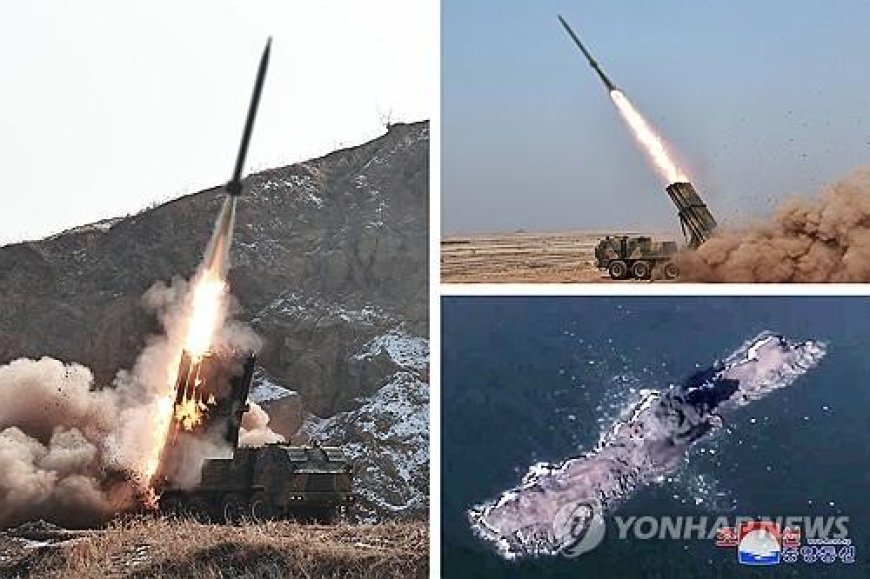North Korea Vows Strong Response to US Submarine's Visit to South Korea
Kim Yo Jong threatens to expand nuclear arsenal as tensions rise on the Korean Peninsula.

Prominent sister Kim Yo Jong of North Korea's leader Kim Jong Un sent a strong warning on Tuesday, pledging to increase the country's nuclear capacity in reaction to the presence of a US nuclear-powered submarine in South Korea. Tensions on the Korean Peninsula already high from recent North Korean missile launches and the opening of a uranium-enrichment facility have been exacerbated by the arrival of the fast-attack submarine USS Vermont in Busan on Monday.
In a speech shown on North Korean official media, Kim Yo Jong demanded an unlimited increase of North Korea's nuclear deterrent while criticizing the United States for what she called a "frantic military and strategic attempt" in the area. With reference to the USS Vermont's presence at the South Korean port, she remarked, "The US strategic assets will never find their resting place in the region of the Korean Peninsula." She cautioned that any military post and port in South Korea might be targets, therefore raising questions about possible North Korean missile tests targeted at sites close to the docking point for the US submarine.
With Washington dispatching potent military assets such aircraft carriers, nuclear-powered submarines, and bombers to South Korea as a show of force, the arrival of the USS Vermont fits among growing US-South Korea military cooperation. Reacting to North Korea's growing nuclear capability, these deployments have been escalated within the past year. The military of the US and South Korea contend that such acts are intended to increase security and discourage North Korea from more nuclear provocations. Pyongyang, however, sees these installations as arrogant posturing that fuels its hostile rhetoric and missile tests.
This most recent development aligns with North Korea's earlier in September provocative activities. The government unveiled pictures of a covert uranium-enrichment plant, signifying a fresh dedication to increase its nuclear weapon count. North Korea also tested upgraded cruise missiles and a ballistic missile meant to carry a 4.5-ton bomb, therefore proving its increasing military prowess. The opening of the uranium plant was noteworthy since North Korea had not publicly displayed such a location since 2010, therefore confirming its will to create more nuclear bombs.
Driven by the regime's view of an ever more hostile international climate, observers believe North Korea's nuclear program has entered a more aggressive stage. Experts point out that Kim Yo Jong's comments especially point to Pyongyang's possible plans for more missile testing meant to show its discontent with US and South Korean military operations. Her remarks have sparked worries about a possible regional escalation, with some analysts cautioning that North Korea might try to launch a missile into Busan or another location housing US vital assets.
Furthermore complicating the matter is North Korea's psychological warfare effort against South Korea since late May. Recalling Cold War-era strategies, the North has flown hundreds of rubbish and possibly dangerous balloons loaded with toxins into South Korean territory. South Korea has responded by starting anti-Pyongyang propaganda loudspeaker broadcasts at the border. The South Korean military issued a warning on Tuesday of possible military action should the balloon campaign intensify to endanger civilians. Although the details of such operation are yet unknown, military officials have decided against airborne balloon destruction because of the possibility such action carries for harmful narcotics.
Growing tensions have attracted international attention; diplomatic measures to lower tensions seem to be becoming more vital. Though North Korea and the US have had several rounds of conversations in the past, negotiations have stagnated and there are little chances for significant communication to resume. Kim Yo Jong's fresh threats highlight the precarious situation on the Korean Peninsula, where both sides seem caught in a cycle of provocation and response.
The world community watches with anxiety as North Korea keeps growing its nuclear weapons and the US increases its military presence in South Korea, trying to prevent a more escalation that may destabilize the area.













































